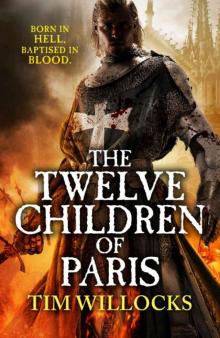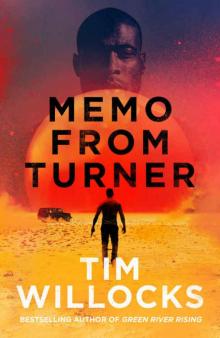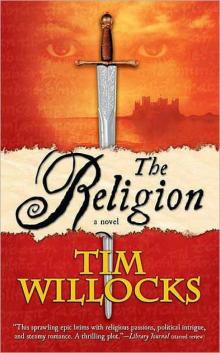- Home
- Tim Willocks
Tim Willocks
Tim Willocks Read online
ALSO BY TIM WILLOCKS
Bad City Blues
Green River Rising
Bloodstained Kings
The Religion
RELIGION
Tim Willocks
Sarah Crichton Books
Farrar, Straus and Giroux
19 Union Square West, New York 10003
Copyright © 2006 by Tim Willocks
All rights reserved
Distributed in Canada by Douglas & McIntyre Ltd.
Printed in the United States of America
Originally published in 2006 by Jonathan Cape, Great Britain
Published in the United States by Sarah Crichton Books / Farrar, Straus and Giroux
First American edition, 2007
Library of Congress Cataloging-in-Publication Data
Willocks, Tim.
The religion / Tim Willocks.
p. cm.
“Sarah Crichton Books.”
“Originally published in 2006 by Jonathan Cape, Great Britain” —T. p. verso.
ISBN-13: 978-0-374-24865-9 (hardcover : alk. paper)
ISBN-10: 0-374-24865-6 (hardcover : alk. paper)
1. Knights of Malta—Fiction. 2. Malta—History—Siege, 1565— Fiction. 3. Crusades—Fiction. I. Title.
PS3573.I456558R45 2007
813′.54—dc22
2006030419
Designed by Jonathan D. Lippincott
www.fsgbooks.com
1 3 5 7 9 10 8 6 4 2
To Chaim Zvi Lipskar and the many
other friends who helped to make this book
Contents
Maps
PROLOGUE: The Devshirme
PART I: A World of Dreams
PART II: Maltese Iliad
PART III: The Winnowing Winds
PART IV: By Dens of Lions Encompassed
PART V: Bloodred Roses
EPILOGUE: The Grace of God
Glossary
Acknowledgments
PROLOGUE
The Devshirme
Spring, A.D.1540
The Fagaras Mountains—East Hungarian Marches
On the night the scarlet horsemen took him away—from all he knew and all he might have known—the moon waxed full in Scorpio, sign of his birth, and as if by the hand of God its incandescence split the alpine valley sheer into that which was dark and that which was light, and the light lit the path of devils to his door. If the dogs of war hadn’t lost their way, the boy would never have been found, and peace and love and labor might have blessed him all his days. But such is the nature of Fate in a time of Chaos. And when is Time not Chaos? And when is War not a spawnhole of fiends? And who dries the tears of the nameless when even saints and martyrs lie sleeping in their crypts? A king had died and his throne was disputed and emperors fought like jackals to seize the spoils. And if emperors care little for the graveyards they scatter in their wake, why should their servants care more? As above, so below, say the wise men, and so it was that night.
His name was Mattias and he was twelve years old and of matters of Policy and State he knew nothing at all. His family were Saxon metalsmiths, transplanted by his migrant grandfather to a steep Carpathian valley and a village of no importance except to those who called it home. He slept by the kitchen hearthstone and dreamed of fire and steel. He awoke in the dark before dawn with his heart a wild bird in his chest. He pulled on boots and a scorch-marked coat and silently—for two sisters and his mother slept next door—he took wood and summoned flames from the pale pink embers in the hearth so that warmth would greet the girls on their rising.
Like all firstborn men of his line, Mattias was a blacksmith. His purpose today was to complete the making of a dagger and this filled him with joy, for what boy would not make real weapons if he could? From the hearth he took a burning brand and stole into the yard and the sharp air filled his chest and he stopped. The world about was painted black and silver by the moon. Above the mountain’s rimrock, constellations wheeled in their sphere and he sought out their shapes and marked them under his breath. Virgo, Bootes, Cassiopeia. Lower down the slopes headlong streaks of brightness marked the valley’s forked stream, and pastures floated misty beneath the woodlands. In the yard, his father’s forge stood like a temple to some prophet unknown and the firelight on its pale stone walls promised magic and marvels, and the doing of Things that no one had done before.
As his father, Kristofer, had taught him, Mattias crossed himself on the threshold and whispered a prayer to Saint James. Kristofer was out on the road, shoeing and sharpening tools for the farms and manors thereabouts. Would he be angry, when he returned, that Mattias had wasted three days’ forging? When he might have made fishhooks or a wood saw or a scythe—goods that always found a ready buyer? No, not if the blade were true. If the blade were true, his father would be proud. Mattias crossed himself and stepped inside.
The forge smelled of ox hooves and sea salt, of clinker, horses, and coal. The firepot was readied as he’d left it the evening before and the kindling caught with the firebrand’s first touch. He worked the bellows and fed yesterday’s coke to the flames, coaxing the fire, building it, until burning charcoal lay two inches deep on the tuyere. He lit the lamp, then unearthed his blade from the ashes in which he’d buried it overnight.
He’d taken two days to straighten and harden the steel, six inches in the blade and four in the tang. Knives he’d made before but this was his first dagger, and the requisite skill was multiplied in the weapon’s doubleedged symmetry and the forging of strength in the spine. He hadn’t perfected the symmetry but the edges didn’t roll beneath a file. He blew away the ash and sighted down the bevels and found no warp or screw. With a damp rag he wiped the blade clean and worked its either surface smooth with pumice. Then he polished the blade until it gleamed dark blue, with powder of Emril and butter. Now would his Art be tested in the temper.
On the charcoal bed he laid a quarter inch of ash, and on the ash the blade, and watched the color creep through the steel, turning it face over face so the heat remained even. When the cutting edges glowed as pale as fresh straw, he pulled the blade clear with the tongs and plunged it into a bucket of damp soil. Burning vapors spiraled with a smell that made him heady. In this first quench, by his grandfather’s lore, the blade laid claim at its birth to the power of all four elements: earth, fire, water, and air. Such a blade would endure. He rebuilt the coal bed and layered the ashes on top, and took the lid from his second quench, a bucket of horse piss. He’d collected it the day before, from the fleetest horse in the village.
“Can I watch, Mattie?”
For a moment his sister’s voice vexed him. This was his work, his place, a man’s place, not a place for a five-year-old girl. But Britta adored him. He always saw her eyes glow when she looked at him. She was the baby of the family. The death of two younger brothers before they could walk remained at the back of Mattias’s mind, or rather, not their deaths but the memory of his mother’s grief and his father’s silent anguish. By the time he turned, his anger was gone, and he smiled to see Britta in the doorway, her silhouette doll-like in the first gray rumor of dawn. She wore a nightshirt and clogs and she clenched her hands about reedy arms as she shivered. Mattias took off his coat as he walked over and slipped it around her shoulders. He picked her up and sat her on the sacks of salt inside the door.
“You can watch from here, as long as you stay back from the fire.” The bargain wasn’t ideal, he could see, but she didn’t demur. “Are Mamma and Gerta still sleeping?” he asked.
Britta nodded. “Yes. But the village dogs are barking. I was scared.”
Mattias cocked an ear. It was true. From down the hill came a chorus of yaps and snarls. Absorbed by the crackle of the forge he hadn’t noticed.
“They must have found a fox,” he said.
“Or a wolf.”
He smiled. “The wolves don’t come here anymore.”
He returned to his blade and found it cool enough to touch. He wiped it clean and laid it once more on the fire. He was tempted to pump the bellows, for he loved the surge of life within the coals, but if the color rose too fast the core of the steel might weaken, and he resisted.
“Why don’t the wolves come here anymore?”
Mattias flipped the blade. “Because they’re afraid of us.”
“Why are the wolves afraid of us?”
The edges flushed dark fawn, like a deer’s coat in autumn, and he grabbed the blade with the tongs and flipped it again, and yes, the color was even and rising still, with magentas in the spine and tang, and the second quench was upon him. He pulled the blade from the forge and plunged it into the urine. The hiss was explosive and he turned his face from the acrid ammoniac steam. He began at once to say an Ave. Halfway through, Britta joined in, stumbling over the Latin, and he continued without waiting, timing the quench by the pace of the prayer until he’d finished, then he pulled the smoking steel from the caustic brew and buried it down in the ash box and wiped his brow.
The second temper was done, he hoped well enough. The pungent bite of the piss quench would impart itself to the metal and keep its sharpness keen. Perhaps too, he hoped, the fleetness of the horse would quicken the dagger to its mark. For the third quench, most magical of all, he would take the glowing blade out to the dense green grass by the vegetable patch, and temper it with the newly fallen dew. No waters were more pure, for no one had ever seen them fall, even if they stayed wakeful through the night, and they flowed from Heaven. Some believed them the tears God shed for His children while they slept. Through such cooling dew the spirit of the mountain would bind to the dagger’s heart and its purpose would always be true. He pushed a pair of tempering tongs into the coals and pumped the fire until the thickened ends glowed orange.
“Mattie, why are the wolves afraid of us?”
“Because they fear we will hunt them and kill them.”
“Why would we hunt and kill them?”
“Because they kill our sheep. And because their skins are warm against the winter. That’s why Dadda wears a wolfskin.”
“Did Dadda kill the wolf?”
Kristofer had indeed, but the story was not for a little girl’s ears. Mattias wiped ashes from the blade and laid it by the fire. Britta was not to be ignored, he knew, but the blade was where his attention was needed most. He said, “Why don’t you sing me a song? Then the song will be part of the steel, and so will you, and it will be your blade as well as mine.”
“Which song? Quickly, Mattie, which song?”
He glanced at her face and saw her flushed with delight and for a moment he wondered if he had not doomed the blade to be hers forever, at least in her mind.
“ ‘The Raven,’ ” he said.
It was a song their mother sang for them and Britta had caused much amazement when, at the age of only three, she had piped her way through every verse. It told of a prince bewitched into a raven by a jealous stepmother, and of the princess who risked the life of her only child to bring him back again. Despite dark deeds it was a happy tale in the end, though Mattias no longer believed it as he once had. Britta still believed every word. She started to sing in her high, trembling voice and its sound filled the gloom of the forge with her stainless soul. And he was glad he’d asked her for the song, for as his father, Kristofer, had told him, no man could comprehend the mystery of steel entire, and if a blade forged during a snowstorm was other than a blade forged in the sun—and who could ever doubt that that was so?—then why would a sound as sweet as Britta now made not leave its imprint too?
As Britta sang he put his all into the final tempering. He quenched the handles of the tongs and clamped their glowing jaws along the dagger’s spine. Thus he drew the hardness, for hardness is not itself strength. When the spine was a solid dark blue he worked the tang and the ricasso darker still. And to the very tip of the blade he gave a pale blue temper, like the early-morning sky on New Year’s Day. And all the while he worked, Britta sang her song, and the raven won the princess’s heart, and in his chest grew the knowledge that this would indeed be a blade to make his father proud. He dropped the heated tongs into the water and took the cool pair. He relaid the bed and spread the ash and placed the blade on the coals with its tip on a raw lump of charcoal. When the cutting edges bloomed the color of his mother’s hair—a fierce, coppery bronze—he’d take the blade to the dew and its moment of truth. He watched the steel as if his place in eternity hinged on it and he didn’t hear the sound Britta made when she fell to the floor. He heard only the sudden silence in her song.
He called out over his shoulder, “Britta, don’t stop now. We’re almost done.”
And there: the hues were changing, rising like alchemical gold, yet the silence remained unbroken and his gut cried out for the song for he knew, in his bones by now, that her voice would indeed forge one blade and not another, and that truly it was hers as well as his, and that they both had fixed some portion of their souls into the metal, and that in that fixing would inhere the blade’s nobility. He turned from the fire, his hand still on the tongs, to find her eyes.
“We’re almost done!” he said.
He found her sprawled on the ground.
Her skull was smashed apart like a broken jar of wine. His coat had fallen from her shoulders. Her nightshirt was drenched with something black that gleamed like streaks of treacle through her pale yellow hair.
Standing over her, with the incurious expression of a farmer who’d spaded a mole, was a stocky youth, wispily bearded and half a head shorter than he. He was swathed in a motley of wrappings and rags and on his head was a filthy green cap. By his side he held a short curved sword, clotted with the treacle and strands of Britta’s hair. When the youth looked up from the murdered child, his eyes were as dead as stones. His roving gaze held Mattias for no more time than he spent on the anvil and the tools. He grunted a question in an alien tongue.
Mattias stood stranded in the forge’s heat yet inside he felt icy and empty. Empty of breath. Empty of will. Empty of each and every feeling he’d formerly known. Some portion of his mind asked if this was how the blade felt in the quench. And if so, which quench? And he took refuge in the fire, where something he did know yet awaited him. He turned and looked at his blade. A fiery bronze crept across the bevels to the dark blue spine. He felt the final temper slipping from his grasp and with it all the magic they’d spun that dawn and with it, too, his father’s pride when he saw what they’d created. These things he could not let stand. He clamped the tongs fast on the ricasso and pulled the blade clear of the coals. Then he turned.
The murderer had started toward him and his face betrayed no alarm until he saw what Mattias carried. The bolt of fear that pierced him betrayed his youth, but earned him no mercy. As if of its own volition the dagger lunged forward, the air a shimmer in its wake. Mattias lurched through the first pace with feet as heavy as lead, and through the second propelled by a rage that choked his gorge. By the third pace raw hatred drove boy and dagger both. The youth cried out in his alien tongue and Mattias ran the blade into his gut. Flesh sizzled on steel as he crammed him back against the wall and the stench of burning wool and fat filled his throat and the stones in the twisted face bulged forth in horror. The murderer screamed and dropped his sword and grabbed and screamed and screamed again as the red hot tang stripped his palms down to their sinews. Mattias clamped his left hand across the gaping lips. He leaned into the tongs until their jaws met the heaving belly and the tip of the dagger grated on what felt like bone. And then he prayed.
“Ave Maria, gratia plena, Dominus tecum, benedicta tu in mulieribus et benedictus fructus ventris tui, Jesus.”
The youth’s gullet convulsed and vomited blood spilled through Mattias’s fingers. He sq
ueezed tighter. Blood sniveled from the flaring nostrils and the skinless hands clawed at the tongs and the stocky chest convulsed in futile spasms. The light in the protuberant eyes began to fade and the spasms waned and Mattias completed his prayer.
“Holy Mary, Mother of God, pray for us sinners, now and at the hour of our death.”
Mattias felt something pass from the body, something that vanished with a stealth that chilled his marrow. Something that had been and now was gone. The youth sagged, heavier than anything Mattias had ever known. The face clamped in his hand was as pale as putty. Its half-closed eyes were lightless and dull, like those in the head of a pig on a butcher’s stall. So this was death and this was killing.
Mattias said, “Amen.”
And he thought: The quench.
He pulled the dagger free. The blade down to the ricasso smoked black as sin. He let the body fold and didn’t look at it again. Amid the distant barking of the dogs he heard coarse foreign shouts and screams of terror. Britta lay in the doorway, bloodied and still. Something had passed from her too that was no more. In his hand the tongs began to shake and so did his knees. His bowels felt loose and his vision was blurred. He turned to the safety of what he knew. The forge, the tools, the fire. He scrubbed the steaming blade with a damp cloth but its blackened hue remained, and somehow he knew that the blade would stay black forever. The steel was too hot to hold, yet he was loath to plunge it again, for in a world turned upside down his mind clung tight to his Art. He dipped the cloth in cold water and wrapped it around the tang. And then he paused.

 Tannhauser 02: The Twelve Children of Paris
Tannhauser 02: The Twelve Children of Paris The Religion
The Religion Tim Willocks
Tim Willocks Doglands
Doglands Memo From Turner
Memo From Turner Bloodstained Kings
Bloodstained Kings The Religion: A Novel
The Religion: A Novel Blood-Stained Kings
Blood-Stained Kings Religion: A Novel
Religion: A Novel